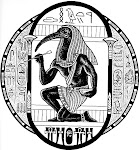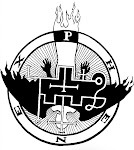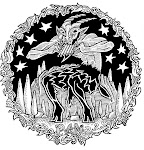
Go your way, a devil way, go your way all!
I bless you with my left hand: foul you befall!
Come again, I warn, as soon as I you call ...
— Titivillus, in Mankind
In my earliest glimpse of the Writer’s Pantheon, when a few of the eternal powers loomed in the forecourt and a host of unfamiliar divinities emerged in majestic procession from the vague chambers beyond, I was compelled to pay my first respects to one of the minor courtiers, the demon Titivillus. I enrolled this medieval imp almost immediately, and illustrated him before all the others, as he seemed to embody the anxieties, eccentricities, and sheer ingenuity of the writer’s diabolic craft.
I first encountered Titivillus during a blissful year spent reading for comprehensive exams. I now repress the results of my exam in early English drama, but I remember the reading list with great affection--- the heroic misanthropy, the divine vengeance, the innumerable daggers, the thundering iambs. I was introduced to Titivillus in the fifteenth-century morality play, Mankind. In the play, Titivillus does his best to undermine the moral progress of Mankind, the drama’s symbolic protagonist. But unlike other medieval demons, Titivillus wasn’t into pitchforking and soul-swallowing. Instead he’d prefer to irritate Mankind to hell with frivolous whispering:
I am here again to make this fellow irk.
Whist! Peace! I shall go to his ear and tittle therein.
Titivillus is the lord of superfluous language and delinquent letters. As “the patron demon of scribes” he lurked in monasteries filling his sack with the scribes’ errors, an occupation he would carry on following the invention of the printing press. When he wasn’t collecting typos, he was monitoring the pious, gathering into his bag any words they stumbled over during prayer, or jotting down irreverent whispers among the congregation.
As a pilferer of words and a muse of misprints, Titivillus has been venerated by practitioners of the literary arts since the thirteenth century, and has kin around the globe. There are typographic demons in Sweden (Tryckfelsnisse), Denmark (Sætternissen), Norway (Trykkleif), Finland (Painovirhepaholainen), Poland (Chochlik Drukarski), Hungary (A nyomda ördöge), Spain (Gazapos), Germany (Druckfehlerteufelchen), and probably anywhere else with words as hard to spell as Painovirhepaholainen and Druckfehlerteufelchen.
My own respect for this spirit is rooted in my life-long struggle with typography. I used to blame heredity for my dreadful spelling and my persistent typographical errors, but I now know I have been bedevilled by the ancient spell (or the misspell) of Titivillus. I’ve filled his sack a thousand times over.
Though he’s likely to do more harm than good, it occurred to me there may be some profit in striking a bargain with Titivillus. I came up with the following Invocation, to be uttered by writers who would beseech the demon to gather up their typos:
Come, Titivillus
While this coarse page teems with sin
I summon thee
Observe this unlawful contract
Take a thousand corruptions in your black canvas
But leave the sentence divine
Titivillus may be a lesser member of the Pantheon, and he’s certainly a risky spirit for writers to invoke, but he’s a wonderful emblem of the scope of literary faith: even spelling errors have a presiding divinity.
Sources
G.A. Lester. Three Late Medieval Morality Plays. London: A&C Black, 1990 (New Mermaids).
“Titivillus” Wikipedia
http://en.wikipedia.org/wiki/Titivillus (accessed 20 December 2008)
“Titivillus – the Typo Demon.” BBC h2g2
http://www.bbc.co.uk/dna/h2g2/A1049979 (accessed 20 December 2008)
“Typographical Personification” Wikipedia
http://en.wikipedia.org/wiki/Typographical_personification (accessed 20 December 2008)
“Who is Titivillus” (Titivillus Editorial Services)
http://www.titivillus-editorial.com/tes-whois.htm (accessed 20 December 2008)
I bless you with my left hand: foul you befall!
Come again, I warn, as soon as I you call ...
— Titivillus, in Mankind
In my earliest glimpse of the Writer’s Pantheon, when a few of the eternal powers loomed in the forecourt and a host of unfamiliar divinities emerged in majestic procession from the vague chambers beyond, I was compelled to pay my first respects to one of the minor courtiers, the demon Titivillus. I enrolled this medieval imp almost immediately, and illustrated him before all the others, as he seemed to embody the anxieties, eccentricities, and sheer ingenuity of the writer’s diabolic craft.
I first encountered Titivillus during a blissful year spent reading for comprehensive exams. I now repress the results of my exam in early English drama, but I remember the reading list with great affection--- the heroic misanthropy, the divine vengeance, the innumerable daggers, the thundering iambs. I was introduced to Titivillus in the fifteenth-century morality play, Mankind. In the play, Titivillus does his best to undermine the moral progress of Mankind, the drama’s symbolic protagonist. But unlike other medieval demons, Titivillus wasn’t into pitchforking and soul-swallowing. Instead he’d prefer to irritate Mankind to hell with frivolous whispering:
I am here again to make this fellow irk.
Whist! Peace! I shall go to his ear and tittle therein.
Titivillus is the lord of superfluous language and delinquent letters. As “the patron demon of scribes” he lurked in monasteries filling his sack with the scribes’ errors, an occupation he would carry on following the invention of the printing press. When he wasn’t collecting typos, he was monitoring the pious, gathering into his bag any words they stumbled over during prayer, or jotting down irreverent whispers among the congregation.
As a pilferer of words and a muse of misprints, Titivillus has been venerated by practitioners of the literary arts since the thirteenth century, and has kin around the globe. There are typographic demons in Sweden (Tryckfelsnisse), Denmark (Sætternissen), Norway (Trykkleif), Finland (Painovirhepaholainen), Poland (Chochlik Drukarski), Hungary (A nyomda ördöge), Spain (Gazapos), Germany (Druckfehlerteufelchen), and probably anywhere else with words as hard to spell as Painovirhepaholainen and Druckfehlerteufelchen.
My own respect for this spirit is rooted in my life-long struggle with typography. I used to blame heredity for my dreadful spelling and my persistent typographical errors, but I now know I have been bedevilled by the ancient spell (or the misspell) of Titivillus. I’ve filled his sack a thousand times over.
Though he’s likely to do more harm than good, it occurred to me there may be some profit in striking a bargain with Titivillus. I came up with the following Invocation, to be uttered by writers who would beseech the demon to gather up their typos:
Come, Titivillus
While this coarse page teems with sin
I summon thee
Observe this unlawful contract
Take a thousand corruptions in your black canvas
But leave the sentence divine
Titivillus may be a lesser member of the Pantheon, and he’s certainly a risky spirit for writers to invoke, but he’s a wonderful emblem of the scope of literary faith: even spelling errors have a presiding divinity.
Sources
G.A. Lester. Three Late Medieval Morality Plays. London: A&C Black, 1990 (New Mermaids).
“Titivillus” Wikipedia
http://en.wikipedia.org/wiki/Titivillus (accessed 20 December 2008)
“Titivillus – the Typo Demon.” BBC h2g2
http://www.bbc.co.uk/dna/h2g2/A1049979 (accessed 20 December 2008)
“Typographical Personification” Wikipedia
http://en.wikipedia.org/wiki/Typographical_personification (accessed 20 December 2008)
“Who is Titivillus” (Titivillus Editorial Services)
http://www.titivillus-editorial.com/tes-whois.htm (accessed 20 December 2008)


















Hi! Are these your illustrations? If so, can I email you about using your Titivillus illustration?
ReplyDeleteAlso, if they are yours, I noticed that this illustration appears on a few different pages around the web(and also on a facebook account). then I don't know whether the pages are yours, or whether you've given prior permission. I found them (and this page) with a google image search for titivillus.
Hi Scott,
ReplyDeleteSorry for the slow response---I haven't worked on the blog in a while. Yes, these are my illustrations ... interesting to see where they pop up! Drop me a line, for sure: writerspantheon@gmail.com
Sev